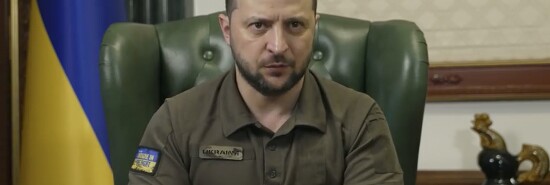
Four things Volodymyr Zelensky must discuss when he addresses Congress on Wednesday
Tom Rogan
After meeting President Joe Biden, Ukrainian president Volodymyr Zelensky will address a joint session of Congress Wednesday evening. Here are some things that Americans should hope to hear from Zelensky.
1) Thank you: The Kiel Institute has been tracking financial, military and humanitarian aid sums committed to Ukraine since Russia’s February invasion. As of Dec. 7, it estimates that the U.S. had provided $51 billion to Ukraine. Congress has authorized around $45 billion in additional funding for Ukraine as part of the omnibus spending bill that leaders hope to pass before Christmas. That’s a lot of money, and when the $45 billion addition is included, far more than the European Union has provided to Ukraine.
While Zelensky has thanked the U.S. for this support, he has sometimes acted as if the U.S. has a moral obligation to do all that it has done. On Wednesday, Zelensky should show unequivocal gratitude when he addresses Congress. The U.S. has provided this great measure of support because more than any other people, the American people stand in support of human freedom. They deserve exceptional recognition.
2) Ukraine will do more to confront corruption: As an extension, Zelensky needs to outline his plans to better confront corruption. This is no small concern. Ukraine remains a systemically corrupt nation in which skimming from state budgets (including by members of the Ukrainian law enforcement and intelligence communities) and the unofficial “taxing” of private enterprises is seen as normal. Zelensky ran for office pledging to address corruption, but his record has been mixed.
Zelensky repeatedly delayed the appointment of an independent anti-corruption prosecutor, only doing so this summer after Western criticism reached a fever pitch. Zelensky’s hidden offshore holdings are also concerning. Of most relevance to the U.S., tens of billions of taxpayer dollars have been provided to support Ukraine’s economy. This makes sense in helping Ukrainians survive amid war, but these funds are particularly vulnerable to theft. Zelensky needs to make sure that where money is stolen, those doing so are held accountable. A positive step would be for him to support for a negotiated agreement between the U.S. and Ukraine, to extradite officials who have stolen or misappropriated U.S. taxpayer money.
FROM BELARUS WITHOUT MUCH LOVE: RUSSIA’S EXAGGERATED OFFENSIVE ASPIRATIONS
3) Under what circumstances Ukraine would talk peace: Ukraine’s conduct of the war has been extraordinary. Its people and armed forces have shown a relentless courage that has fully rebutted Vladimir Putin’s repeated fictional presentation of Ukraine as a simple extension of mother Russia. Yet as Ukraine continues its counteroffensives in 2023, possibly even pushing back Russian forces to the periphery of Crimea and the Russian mainland border, Zelensky should face more questions as to when it becomes appropriate to seek a peace accord with Putin. Yes, only Ukraine should decide these circumstances. The U.S. should not, for example, adopt the Franco-German strategy of not-so-subtly pressuring Ukraine to agree a ceasefire on terms it is uncomfortable with.
Still, Congress has an interest in knowing what terms Zelensky would accept for a durable peace accord. U.S. support for Ukraine should continue to be robust, but must put U.S. strategic interests first. That means being informed as to Zelensky’s agenda, especially with regards to Crimea.
4) Ukraine will be honest: Albeit rarely, Zelensky’s government has sometimes shown erratic decision making and a flexible relationship with the truth. This was most recently obvious with the mid-November incident wherein a Ukrainian air defense missile went off course and killed two farmers in Poland. Ukrainian leaders insisted that the missile was not launched by Ukrainian forces, but instead by Russia. They did so even as evidence became apparent that a Ukrainian missile failure was most likely responsible. Blaming Russia, Ukraine hoped to boost Western support for themselves. But this unabashed denial of reality undermined Ukraine’s credibility as a reliable partner. Such a flexible relationship with the truth is from Putin’s school of political theory. It should not be replicated by Ukraine.
As an extension, Ukraine’s assassination of a Russian ultra-nationalist outside Moscow in August was unjustified and self-defeating. At the margin, the attack fueled Putin’s false presentation of the conflict as a struggle for the Russian nation’s survival. If Zelensky wants to maintain U.S. support for the long term, he must go above and beyond to ensure he can be trusted as a reliable party. This is particularly important in the context of Russian threats of nuclear escalation.
CLICK HERE TO READ MORE FROM THE WASHINGTON EXAMINER
